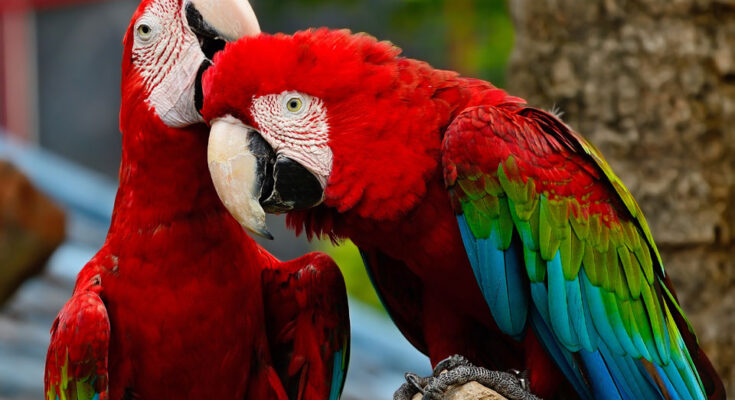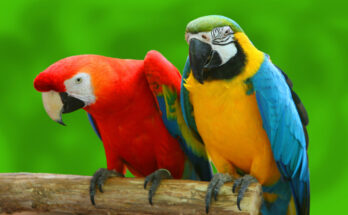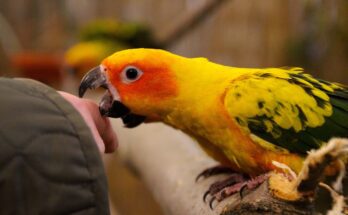Parrots are colorful, intelligent, and full of personality. They can become loving companions and even learn to talk, making them one of the most popular pet birds in the world. But parrots are not just beautiful pets; they need proper care and attention to live a long and happy life. If you are thinking of getting a parrot or already have one, this guide will help you take care of your feathered friend in the best way possible.
1. Choosing the Right Parrot
There are many types of parrots, such as Budgies, Cockatiels, African Grey Parrots, Macaws, and Amazons. Some parrots are small and easy to care for, while others are big and need more time and space.
Things to consider before getting a parrot:
- Size and space: Do you have enough space for a large cage?
- Noise level: Some parrots can be very loud.
- Lifespan: Many parrots live 20–50 years, and some even longer.
- Time and attention: Parrots are social birds and need daily interaction.
Choose a parrot that suits your lifestyle and experience level. Beginners often start with budgies or cockatiels because they are easier to handle.
2. Housing Your Parrot
A parrot needs a safe and comfortable cage because it will spend a lot of time in it.
Cage Requirements:
- Size: The cage should be spacious enough for the parrot to stretch its wings and move around. A bigger cage is always better.
- Bar spacing: Make sure the bars are not too wide so your parrot can’t escape or get its head stuck.
- Location: Keep the cage in a quiet but social area of the house (like a living room). Avoid kitchens because of smoke and fumes.
- Perches: Place perches of different sizes and textures to keep their feet healthy.
- Toys: Parrots love to play. Provide safe toys like wooden blocks, ropes, and bells.
Cleaning:
- Clean food and water bowls daily.
- Remove waste and clean the cage floor every day.
- Do a deep cage cleaning once a week to keep it hygienic and odor-free.
3. Feeding Your Parrot
A healthy diet is very important for your parrot’s health and long life.
What to feed your parrot:
- Pellets: High-quality bird pellets should make up 60–70% of their diet.
- Fresh fruits and vegetables: Give apples, carrots, spinach, kale, broccoli, bananas, and grapes. Avoid avocado as it is toxic to parrots.
- Seeds and nuts: Seeds are tasty, but they should be given in small amounts because they are high in fat. Nuts like almonds and walnuts can be given as treats.
- Fresh water: Always keep clean and fresh water available. Change it daily.
What not to feed:
- Chocolate, caffeine, alcohol.
- Avocado, onions, garlic, and salty or sugary foods.
- Junk food and fried food.
A good diet keeps your parrot’s feathers shiny, boosts immunity, and prevents illness.
4. Social Interaction and Bonding
Parrots are highly social and intelligent birds. They love spending time with their human companions. If they are ignored or left alone for too long, they can become stressed or even start plucking their feathers.
Tips to bond with your parrot:
- Spend at least 1–2 hours daily interacting with your parrot.
- Talk to them softly, whistle, or teach them simple words.
- Offer treats from your hand to build trust.
- Play games like fetch or hide-and-seek using their toys.
Parrots also enjoy music, so you can play soft tunes when you are around.
5. Training Your Parrot
Parrots are smart and can learn tricks and even words. Training them not only makes them smarter but also helps build a stronger bond between you.
How to train:
- Use positive reinforcement (give treats when they do the right thing).
- Start with simple commands like “step up” on your finger or “stay.”
- Keep training sessions short (10–15 minutes) to avoid boredom.
- Be patient. Parrots learn slowly but surely.
Some parrots can learn to mimic words and sounds. African Greys are known as the best talkers, but even small budgies can learn to say simple words.
6. Exercise and Toys
Parrots need daily exercise to stay fit and happy. Without activity, they can become overweight or develop behavior problems.
- Allow your parrot to fly in a safe room (windows and doors closed, fans turned off).
- If flying is not possible, let them climb and play outside the cage for at least an hour.
- Provide toys like swings, chew toys, ropes, and ladders to keep them busy.
- Rotate toys every week to keep them interested.
Exercise not only keeps their body healthy but also keeps their mind sharp.
7. Grooming Your Parrot
Parrots love to stay clean, and you can help them stay healthy with simple grooming.
Basic grooming tips:
- Bathing: Offer a shallow bowl of water or use a spray bottle to gently mist them. Most parrots enjoy bathing.
- Nail trimming: Their nails may grow too long and need trimming. You can take them to a vet or learn to do it safely at home.
- Beak care: A healthy diet and chew toys naturally keep their beaks trimmed.
Never use strong soaps or chemicals on parrots. Clean water is enough for bathing.
8. Health Care
A healthy parrot is active, alert, and has shiny feathers. But parrots can get sick if not cared for properly.
Signs of illness:
- Sitting quietly for long periods.
- Loss of appetite or drinking less water.
- Fluffed-up feathers all the time.
- Discharge from nose or eyes.
- Changes in droppings.
If you notice these signs, take your parrot to an avian veterinarian. Regular checkups are also important because parrots can hide illness until it becomes serious.
9. Safety Tips
Parrots are curious and like to explore, but your home can have many dangers.
- Keep windows and doors closed when your parrot is outside its cage.
- Remove toxic plants from the house.
- Keep electrical wires, small objects, and chemicals away.
- Avoid using non-stick cookware (Teflon) as its fumes can be deadly to birds.
A safe environment ensures your parrot stays happy and healthy.
10. Love and Patience
Parrots are not just pets; they become family. They need love, patience, and attention every day. Some parrots live more than 50 years, which means you are choosing a lifelong friend.
- Talk to your parrot daily and be gentle with them.
- Be patient when training or bonding because trust takes time.
- Understand their body language—flapping wings, tail wagging, or head bobbing often mean happiness.
When you give them love and care, parrots reward you with affection, funny behavior, and sometimes even words of love back to you.
Final Thoughts
Parrots are beautiful, intelligent, and loving companions. But owning one is a big responsibility because they need daily care, social interaction, healthy food, and a safe environment. If you give them the attention and care they deserve, your parrot will not only stay healthy but will also bring joy and happiness to your life for many years.




